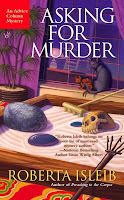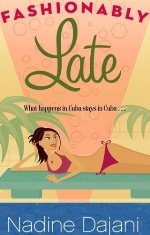Wednesday, October 01, 2008
Tuesday, September 30, 2008
Harriet Klausner Review for Cutting Loose
"…the key to this superb character study is (that) cast members all are fully developed and seem genuine as each seeks happiness although none appear to know how to obtain it… Readers will relish following the escapades of the women and the two brothers who chase them whether it is Canada, Florida or London. Nadine Dajani provides a wonderful contemporary tale."
Harriet Klausner
Thursday, September 25, 2008
GCC Presents...Roberta Isleib!
.jpg)
Tuesday, September 23, 2008
Candace Bushnell in Grand Cayman
And this time, it's CANDACE BUSHNELL.
THE Candace Bushnell.
She'll be reading from her latest release, One Fifth Avenue, at our local Books&Books.
The best part? An after party at a swanky resto-lounge around the corner from the bookstore.
I bought my copy of the book this morning, which came with a ticket to the signing/after party, and I started reading. I have to say, this one sounds like it's going to be different from the previous few efforts. It seems Bushnell gets more complex with every book, which I suppose is a trend that makes sense. She also seems to have branched out from the fashion/modeling/Hollywood backdrop into... you guessed it... Hedge Fund Accounting (well... insofar as you can for something that's supposed to be entertaining).
In a recent interview where I was asked to explain why I'd given up on fashion after such a brief stint in the industry, I did that, among many other reasons, I missed the "glamour" that came with international finance.
I guess I wasn't the only one who's made the unlikely connection...
Here's an interview with Ms Bushnell. Happy Monday.
Monday, September 15, 2008
Black Monday and Generation Me
I went to bed last night, my head spinning somewhat after a long day playing Frisbee on the beach, a party where a little too much wine had been had, and confusing internet headlines about Lehman Brothers, one of the oldest investment banks around, possibly going the way of the Dodo bird (and many other birds these days).
This morning the rumors and speculation turned into tragic fact. Not as tragic as, say, deadly hurricanes turning beleaguered cities and island nations into muddy swamps and war zone look-alikes, but tragedies nonetheless. The cliché of business being "just business" and totally divorced from its role in communities, identity, and just plain survival, is now being tried against a class of people not familiar with the idea that sometimes hard work, planning, and intense "wanting it" do not necessarily materialize into success. Sometimes they don't even materialize into a week's worth of groceries. Jane Green recently blogged about a phenomenon I'd noticed but hadn't really thought about until recently – the entitlement philosophy – which has led to a whole generation of people (dubbed "Generation Me") thinking they should be applauded and showered with all the material and psychological gifts associated with achievement just for showing up. There's even a popular saying – "80% of life is just showing up". A generation drunk on self-importance, disdainful of "lesser" people, and patting itself on the back because it did nothing more than win the "lucky birth" sweepstakes.
I wonder how this philosophy plays out in Brazilian shanty towns where armed gangs of children scavenge for food (anyone who has not yet seen City of God needs to RUN, not walk, to the video store), or pretty much anywhere in Africa, Latin America, huge swaths of Eastern Europe, the Middle and Far East, or indigenous Australia and the South Pacific Islands, where increases in food prices this year have meant absolute catastrophe for millions.
Or even in Middle America, where "middle" now means barely above the poverty line.
It is, in fact, a dog-eat-dog world out there folks, and no amount of reality TV, books, articles, or "vicarious luxury" products like designer perfumes, handbags, shoes and "bridge" lines trying to sell us an alternative universe of untold riches available to the average Joe and Jane will change that. It's not about "showing up". It was about consuming, at least as far as this continent was concerned, and now America is in the process of passing the baton of conspicuous consumption over to other ambitious nations that have clawed their way up to this privilege.
And yet, all I hear about is Bristol Palin's pregnancy, Palin as a pig with lipstick, pro-choice/anti-choice, drilling, drilling, and more drilling, and barely any acknowledgment at all from the people currently running the show that there's any problem at all, that the price you pay for having the freedom to buy the biggest car your line of credit will get you, the biggest house in the fanciest neighborhood your mortgage broker says you qualify for, and as many useless gadgets as you feel like, is that sometimes you will go broke. It's called a "market economy" and it's a tailor-made philosophy for Generation Me. It speaks to disinterest in people perceived as "lesser" and their problems, to the feeling that anyone who is good enough can be on the winning side, to the hope that you can one day be one of the thousands of millionaires (and even billionaires!) this wonderful country manufactures.
Now, that's all good and well when it's factory workers, mechanics, janitors, teachers, firemen, and Wal-mart greeters who are falling through the cracks of no-holds-barred capitalism. They didn't go to school. They didn't work hard enough. They didn't want it badly enough. They didn't earn their success.
I wonder if the (former) investment bankers, admin assistants, accountants, lawyers, and IT support technicians are giving each other the "you should have wanted it more" pep talk this morning. I wonder, as these people might currently be wondering if they'll get any severance pay at all, if laid-off accountants and IT administrators, and secretaries will continue to be hostile towards labor unions who guarantee things like severance pay.
Will white-collar workers' inflated sense of entitlement finally bring about the kind of grassroots change, righteous anger, and standing up to corporate interests that blue-collar workers failed to achieve? Because we're not talking about construction workers, nurses or janitors anymore – we're talking about US and this isn't supposed to happen to US!
The silver lining of this dark economic cloud is that we may see the end of Generation Me, and perhaps, if we're lucky, a Generation We, or at least, a Generation Aware. Maybe I'm living in some sort of fantasy land that exists only in my head, but perhaps when people like me and my friends start getting laid off from our well-paying jobs, when we see it won't be so easy to get back on our feet this time, when our home values (and retirement packages) begin to erode, we may no longer be as quick to blame the poor for their poverty, to be aghast at a welfare system that guarantees healthcare to everyone, even if it means having to wait our turn in line. Maybe we will endeavor to be less ignorant, to focus less on acquiring "market skills" now that we know how fickle the market is, and get ourselves some life skills instead, some humility, a sense of history, and our miniscule, insignificant place within it.
But, judging by how mesmerized the public remains by this magician's trick of a cute, hopelessly clueless (or pretending to be) hockey mom with a king crab for table-top knick-knack, and no ideas about how to steer the economy if not towards a recovery but at least away from certain doom, I think my fantasy will remain just that – a fantasy.
Tuesday, September 09, 2008
GCC Presents… Joanne Rendell!

I loved this quote from Christina Baker Kline about The Professors' Wives Club: "…risk it all in pursuit of life, love, and green space in New York City…"
I've always thought Montreal was a smaller, "frenchier" version of New York City and I also attended one of those downtown University campuses where green space was coveted than prime balcony space during Mardi Gras in Rio. So I can see how a group of four very different women, each with her own secrets, can get their collective panties in a bunch when the ruthless Dean of Manhattan University tries to bring an end to the charming garden sanctuary where each woman comes to take refuge from the world. Also, like Rendall, I'm a sucker for stories that pit women with widely divergent points of view against each other.
Here's the author, in her own words:
Can you tell us about any real-life events that inspired a scene or two in your book?
I'm a professor's wife and my husband teaches at NYU – which looks a lot like the fictitious Manhattan U. in The Professors' Wives' Club - so real-life sneaks into my book a lot! One particular scene, however, which is very true to my life, is when the character Sofia gives birth watching Terminator movies. It is what I did when I gave birth to my son. No kidding! You can read about it on Mothering.com: http://www.mothering.com/articles/pregnancy_birth/homebirth/terminator.html
Can you tell us a bit about your writing process? Do you have a writing routine you stick to or a special writing space that brings out your creativity?
I write while my five year old son sleeps. Thankfully, he sleeps late every morning which gives me just about enough time to go the gym, come home, make my cup of Tetley tea, and then sit down to do some writing. It would be great to have my whole days free to write. But, in actual fact, I think I'm probably more productive being limited to just a few hours in the morning. It makes me get down to work, pronto! If I had whole days stretching out before me, I would spend way too much time emailing and nosing through people's photo albums on Facebook.
I always try and write at least 500 words a day. I started doing this in grad school when I was writing my PhD dissertation. 500 words might not seem a lot but it definitely adds up and keeps you moving forward.
Do you have an agent? Can you tell us the story behind meeting and signing with him/her?
I do have a wonderful agent! I was working on a writing project with a friend of mine - another professor's wife, in fact! This friend was already published and was kind enough to introduce me to her agent. The agent and I hit it off and I remember during one conversation, almost as an aide, I mentioned my idea about writing a book called The Professors' Wives' Club. My agent looked me dead in the eye and said "Write it, it will sell." So I did write it and my agent was kind enough to read drafts along the way and give me advice. When it was finally done and it sold to Penguin, we really saw the book as "our" baby!
What's the next book, fiction or non-fiction, you're dying to read next?
Yours! Seriously, it's true. You just sent me an advanced copy of Cutting Loose and I'm dying to get to the end of another book I'm reading so I can start it. It sounds like it has all the ingredients of the kind of women's fiction I love - a tale about a group of interesting women, some good love stories, plus insight into places and cultures I know little about. I can't wait! [wow…I'm blushing right now…]
There are so many wonderful books out there like yours – books by women, for women, and about women. I wish I had more time to read them all. I also wish the reviewing press weren't so dismissive and demeaning about women's fiction. It makes me so mad that women's fiction so often gets labeled "trash," "fluff," or "formulaic." Women do most of the buying and the reading of books these days and thus it seems ridiculous that "our" fiction is so routinely denigrated…..Okay, rant over.
What up next for you?
My second novel is also being published by Penguin and comes out next year. The novel tells the story of two women, professors this time, who work an English Department. One of the women, Diana, is older, very serious, and extremely established in the academic world. She's only interested in very serious literature and has written books about Sylvia Plath. The other professor, Rachel, is new to the department. She's young, bubbly, and enthusiastic and her scholarship looks at popular women's fiction. Her research ruffles a lot of feathers in the academy, in fact, because people see the books Rachel looks at as throwaway and trash. Diana is particularly adamant on this point and really doesn't like it when the young professor comes to the department.
The novel looks at the tensions between these two very different women and shows all the repercussions in their department and in their lives when they are pitted next to each other. A handsome visiting professor from Harvard and some high-profile misbehaving students only serves to make sparks fly even more between the two women! [Hmm… I'm liking the sound of this novel already… I'm also sensing a theme : ) ]
Thanks Joanne, for a very interesting interview. Looking forward to picking up The Professors' Wives Club very soon!
Monday, September 08, 2008
Superrich
I didn't know I had an obsession until I took a critical look at my recent entertainment choices, choices that at the time seemed positively random:
- Deluxe by Dana Thomas
- Richistan by Robert Frank
- My Super Sweet Sixteen
- Some MNBC show devoted to how the other half, or more accurately, the top 0.01% lives
This form of entertainment feels part voyeurism, part sheer envy, part research on how to infiltrate the world of the Superrich (answer: start a tech company, inflate its value, launch an IPO followed by a "liquidity event", and all within a year) and finally, part train-wreck-watching.
First, some jargon.
Richistan devides its population into 3 subsets: Lower Richistan ($1 million to 9 million in annual revenue), middle Richistan (10 to 99 million), and upper Richistan (100 million plus. In case you are wondering, John McCain is a member of Upper Richistan via his wealthy wife).
Do you know what the median household income in the United States is? It's $26,000 per household. If we assume the population of the US is 300 million, this means that 150 million Americans are living in households earning $26,000 or less.
Or less.
Politicians will usually talk about the "average" income – not median – because the average is a very top level figure that doesn't show you what's happening at the bottom, or how big the "bottom" is.
For example, if in Company X the CEO makes $1,000,000 a year, his VP $100,000, his secretary 25,000 and his two laborers $15,000 each, then the average income per employee of Company X is $231,000/year.
This is the figure usually quoted by politicians: $231,000 per year, per employee.
Makes those laborer's jobs sound great, right? I would LOVE to be working at a company where the average income was $231,000 a year!
The figure you won't hear about as often is the median. The median in this case is $25,000. Half the workers at this company earn less than $25,000, while half of them earn more.
Even though that figure gives us a slightly more realistic picture than the average, it still doesn't tell us that the CEO earns 10 times the salary of the next highest paid employee, and 67 times that of the lowest paid worker.
Of course, this is a totally fictional scenario.
In real life, the average CEO earns 821 times that of the lowest paid worker (2005 figures).
This was not so a mere two decades ago, but I digress. The point of this whole discussion is to provide an answer to the inevitable question that popped into my mind after reading these books and watching a couple of nauseating back-to-back My Super Sweet Sixteen episodes: WHO ARE THESE PEOPLE???
Richistan did a good job of answering this question, and also addressing the "how" of how these people came to be. Deluxe, however, though very entertaining especially to an avowed fashionista, devoted its 300+ pages to examining how the luxury industry (Vuitton, Gucci, Prada, Coach….) had sold out the Superrich by slapping their coveted logos on more pedestrian, affordable items like the $50 bottle of perfume, the $32 lipstick, or the $700 "It" bag. The final question Deluxe sought to answer was: where do the Superrich go now?
Where, indeed.



